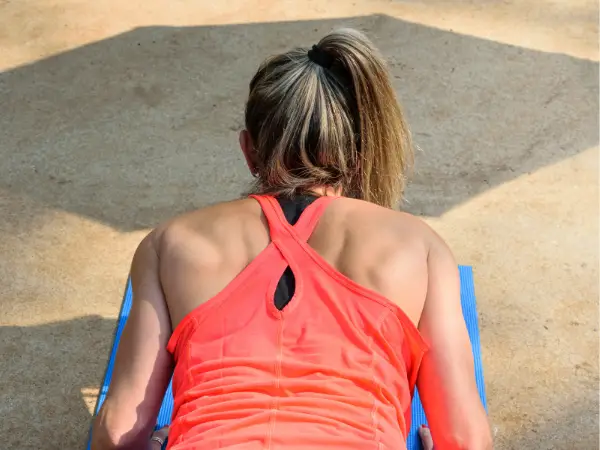Yes, you can sleep with an abdominal board if your doctor approves, as it may aid post-surgical recovery. Ensure it is positioned correctly for comfort and effectiveness.
Exploring the use of an abdominal board after surgery, especially procedures like liposuction or tummy tucks, reveals its importance in the healing process. An abdominal board is a medical accessory designed to provide compression and support to the abdomen, which can help reduce swelling and ensure that the skin adheres to the underlying tissue as it heals.
Patients often wonder about the feasibility of wearing this device during sleep. Sleeping with an abdominal board can be beneficial, but it’s essential to follow medical advice for optimal recovery. Comfort and proper positioning are key factors to consider for those who choose to use an abdominal board overnight. This accessory can be part of a comprehensive post-operative care plan that includes rest, proper nutrition, and limited physical activity.
Table of Contents
The Abdominal Board
The Abdominal Board is a term that might sound like it belongs in a gym. Yet, it’s also a key player in the world of post-surgical recovery. For those wondering about sleeping with such a device, understanding its role is crucial. An abdominal board is not just a workout aid. It serves a specific purpose after certain surgeries. Let’s delve into what an abdominal board is and its intended use.
What Is An Abdominal Board?
An abdominal board is a firm, often foam-covered board designed to provide support. Think of it as a friend that hugs your midsection. It’s used primarily after surgeries like a tummy tuck or liposuction. The idea is to help your body shape up as it heals. Here are some key points:
- Material: Usually made of foam and covered with a soft fabric.
- Shape: Curved to match the contours of your abdominal area.
- Size: Varies, but designed to cover the entire surgical area.
Imagine a table showing different types of abdominal boards:
| Type | Size | Material | Use Case |
|---|---|---|---|
| Standard | Medium | Foam | Post-surgery |
| Full Coverage | Large | Memory Foam | Extended support |
| Adjustable | Varies | Foam with straps | Custom fit |
Purpose Of An Abdominal Board
The purpose of an abdominal board goes beyond comfort. It’s a tool that serves several roles:
- Compression: It provides even pressure on the abdomen.
- Support: It offers stability to the midsection while healing.
- Shape: It helps the skin adhere to the underlying tissue post-surgery.
Let’s break down its uses:
- Post-Surgical Recovery: Doctors often recommend it after a tummy tuck or liposuction.
- Improved Healing: It aids in reducing swelling and preventing fluid buildup.
- Enhanced Comfort: By securing the area, it can make movements like walking or lying down more comfortable.
Whether you’re on the road to recovery or contemplating a surgical procedure, knowing the role of an abdominal board is vital. It’s not just about getting back to daily activities. It’s about healing right and feeling your best during the process.
Sleeping With An Abdominal Board
Many people wonder about sleeping with an abdominal board. They ask, “Can you sleep with it?” Let’s dive into this topic. We’ll explore if it’s safe and share some tips.
Is It Safe To Sleep With An Abdominal Board?
Yes, it can be safe to sleep with an abdominal board. But, you must do it right. Here’s what you need to know:
- Consult a doctor first. Always check with a healthcare professional.
- Comfort is key. It should not hurt or cause discomfort.
- Proper size matters. Ensure it fits your body well.
People often use abdominal boards after surgery to help shape and support their belly. Sleeping with one can aid recovery. Yet, everyone’s body is different. What works for one might not work for another. Listen to your body.
| Pros | Cons |
|---|---|
| Supports healing | Can be uncomfortable |
| Helps shape the belly | May shift during sleep |
| May reduce swelling | Not suitable for everyone |
Tips For Sleeping With An Abdominal Board
Want to try sleeping with an abdominal board? Follow these tips for a better experience:
- Start slowly. Try it for a few hours at first.
- Use soft padding. This makes it more comfortable.
- Adjust as needed. If it moves, fix it before sleeping again.
- Listen to your body. Stop if it hurts or feels wrong.
Remember, it’s all about finding what works for you. Some people love it. Others don’t. It’s okay to change your mind. The goal is to help your body heal and feel good. Pay attention to how you feel. Make changes as needed. And always, keep your doctor in the loop.
- Wear it over a thin shirt to avoid skin irritation.
- Check the position before you sleep to ensure it’s in place.
- Don’t wear it too tight. It should not stop you from breathing easily.
With these tips, you can make sleeping with an abdominal board work for you. It’s all about safety and comfort. Find what helps you heal and feel your best.

Potential Risks And Considerations
Can You Sleep With an Abdominal Board? This question may cross your mind after a tummy tuck or liposuction. It’s vital to understand the potential risks and things to consider. Let’s delve into why sleeping with an abdominal board might not be the best choice and what you should think about before using one.
Potential Risks Of Sleeping With An Abdominal Board
Sleeping with an abdominal board may seem like a good way to support your recovery. Yet, it comes with risks. These risks can affect your health and healing process. Here are some points to be aware of:
- Discomfort and Pain: An abdominal board is rigid. It can cause discomfort or pain, leading to a poor night’s sleep.
- Restricted Blood Flow: Pressure on your abdomen for hours might slow blood flow. This can delay healing and increase the risk of complications.
- Skin Issues: Extended pressure can cause skin irritation or damage. It can lead to sores or rashes.
- Impaired Breathing: A tight abdominal board may make it hard to breathe deeply. This is especially true if you are lying down.
Think about these risks before deciding to sleep with an abdominal board. Your comfort and safety should be your top priority. Consult with a medical professional for personalized advice.
Considerations Before Using An Abdominal Board For Sleep
Before using an abdominal board for sleep, you need to weigh several factors. These considerations ensure you make an informed decision. Here’s what to keep in mind:
- Doctor’s Recommendation: Always follow your surgeon’s advice. They know what’s best for your specific case.
- Healing Stage: Your body’s healing stage will determine if an abdominal board is suitable. Early on, it might not be recommended.
- Comfort Level: Ensure the board does not cause pain or disrupt sleep. Comfort is crucial for recovery.
- Alternatives: Explore other support options. There may be softer, more flexible alternatives that offer comfort and support.
Remember, the goal is to recover safely and comfortably. Take these points seriously and talk to your healthcare provider for guidance tailored to your needs.
Alternatives To An Abdominal Board
Abdominal boards are tools some people use after surgeries to help with healing. But can you sleep with one? It’s important to know that while they offer support, comfort is crucial for a good night’s rest. Let’s explore effective alternatives to abdominal boards for those seeking comfortable abdominal support while sleeping.
Alternative Methods For Abdominal Support During Sleep
Sleep is essential for recovery, and finding the right support is key. Here are some alternatives to abdominal boards that can help:
- Body Pillows: Provide gentle support and conform to your body’s shape.
- Adjustable Beds: Let you change your sleeping position to reduce pressure on the abdomen.
- Compression Garments: Offer consistent support without the bulkiness of a board.
Consider the following table for a better understanding of each alternative’s benefits:
| Alternative | Benefits |
|---|---|
| Body Pillows | Contours to body, versatile, soft |
| Adjustable Beds | Customizable positions, reduces strain |
| Compression Garments | Even support, less intrusive, promotes circulation |
Comparing Abdominal Boards With Other Supportive Devices
When choosing the right support for sleep, consider these points:
- Comfort: Abdominal boards may be less comfortable than softer alternatives.
- Flexibility: Other devices like body pillows offer more flexibility for different sleeping positions.
- Usability: Compression garments are easier to use compared to rigid boards.
The table below compares the key features of abdominal boards with other devices:
| Device | Comfort Level | Flexibility | Usability |
|---|---|---|---|
| Abdominal Board | Low | Low | Medium |
| Body Pillow | High | High | High |
| Adjustable Bed | Medium to High | High | Medium |
| Compression Garment | Medium | Medium | High |
Choosing The Right Abdominal Board
Wearing an abdominal board after surgery or for body shaping is common. It’s vital to choose the right one for comfort and effectiveness. Can you sleep with it, though? That depends on the type you pick and how it fits your body. Let’s explore what to look for in an abdominal board, so you can decide if it’s safe to sleep in.
Factors To Consider When Selecting An Abdominal Board
Selecting the perfect abdominal board involves several key factors. These ensure comfort and safety. Let’s break down what you should keep in mind:
- Material: Look for skin-friendly, breathable fabrics that won’t irritate.
- Size: Measure your body accurately. A snug fit is crucial.
- Comfort: It should feel comfortable, especially if you plan to sleep in it.
- Support: The board must offer proper support to prevent injury.
- Adjustability: Options to adjust the fit can be a game-changer.
These factors contribute to a smart choice. Always prioritize comfort and support to avoid complications.
| Factor | Why It’s Important |
|---|---|
| Material | Prevents skin issues and ensures breathability. |
| Size | Avoids slipping and provides effective compression. |
| Comfort | Essential for prolonged use, including sleep. |
| Support | Maintains posture and aids in recovery. |
| Adjustability | Allows for changes in body size and comfort levels. |
Types Of Abdominal Boards And Their Features
Different types of abdominal boards serve various needs. Here are some common styles and their features:
- Compression Boards: They provide firm, even pressure to smooth the abdomen.
- Foam Boards: These are soft, flexible, and suitable for initial post-surgery phases.
- Lipo Boards: Designed for post-liposuction support, they help with skin retraction.
- Bariatric Boards: Made for larger individuals, offering extra support and coverage.
Each type has unique features. The right choice aligns with your specific needs and recovery stage. Always consult with a healthcare provider before making your decision.
Expert Insights
Sleep is vital for health, and comfort is key to good sleep. Can you sleep with an abdominal board? This question has been on the minds of many looking for post-surgical support or enhanced sleep comfort. This blog post delves into expert insights from medical professionals and firsthand accounts of individuals who have ventured into sleeping with abdominal boards. The goal is to provide a clear understanding of the potential benefits and drawbacks.
Medical Professional’s Perspective On Using Abdominal Boards For Sleep
Doctors and surgeons often prescribe abdominal boards after procedures like a tummy tuck or liposuction. The primary use is to aid in recovery, not sleep. Medical professionals emphasize that the decision to use an abdominal board for sleep should be approached with caution. Here are some key points to consider:
- Support: Abdominal boards provide firm support, which may benefit post-operative recovery.
- Healing: They help to reduce swelling and ensure proper healing of the surgical area.
- Comfort: While designed for support, comfort during sleep may vary greatly.
- Safety: Using the board for extended periods without medical advice could pose risks.
The choice to sleep with an abdominal board should always involve a consultation with a healthcare provider. Here’s a table summarizing what experts say:
| Consideration | Expert Insight |
|---|---|
| Use Case | Recommended primarily for post-surgical recovery, not as a sleep aid. |
| Duration | Limited use; extended periods only under medical supervision. |
| Comfort Level | Varies; not designed for general sleep comfort. |
| Risks | Potential for discomfort or complications without proper guidance. |
Experiences Of Individuals Who Have Used Abdominal Boards For Sleep
Personal stories shed light on the practical side of using abdominal boards for sleep. Users often turn to these boards seeking stability and comfort during the night. Here’s what some individuals have experienced:
- Improved Posture: Some users report better sleeping posture, which might reduce back pain.
- Varied Comfort: Others find the firmness uncomfortable, leading to sleep disruption.
- Adaptation Period: It often takes time to get used to the sensation of sleeping on a board.
- Consultation Is Key: Those who consulted with doctors typically had better outcomes.
While experiences vary, a common theme is the importance of individual assessment. Below is a list of factors individuals considered before using an abdominal board for sleep:
- Doctor’s advice on suitability for their specific condition.
- Personal comfort needs and sleep preferences.
- Adjustment time and willingness to adapt to the board.
- Potential benefits versus possible discomfort.
Overall, users emphasize that while an abdominal board may offer some benefits, it is not a one-size-fits-all solution. Personal comfort, medical advice, and careful consideration are crucial for a positive experience.
Faqs About Abdominal Boards For Sleep
Are you thinking about sleeping with an abdominal board after surgery? Many people do. It’s vital to know the facts to ensure a good night’s sleep and proper recovery. Below are some frequently asked questions about using abdominal boards for sleep. This will help you understand what to expect and how to do it right.
Common Questions And Answers About Sleeping With An Abdominal Board
Using an abdominal board while sleeping can be confusing. Let’s clear that up with some common questions:
- Can I sleep with an abdominal board? Yes, it’s often recommended post-surgery to aid in healing.
- Will it be comfortable? Comfort varies. Proper positioning can help.
- How long should I use it? Follow your doctor’s advice. It’s usually for a few weeks.
Here’s a quick guide:
| Question | Answer |
|---|---|
| Is it safe? | Yes, with proper use. |
| Any side effects? | Minor discomfort is possible. |
| Best position to sleep in? | On your back, slightly elevated. |
Addressing Concerns And Misconceptions
Some people worry about sleeping with an abdominal board. Let’s address these concerns:
- Will it cause pain? It should not cause pain. If it does, talk to your doctor.
- Can it move while I sleep? It may shift. Secure it well before sleep.
- Does it slow healing? No, it supports healing by keeping the area stable.
And for common misconceptions:
- It’s not a “quick fix” for weight loss.
- It won’t cause permanent body changes.
- It’s not a substitute for a healthy lifestyle.
Remember, your doctor’s advice is key. Use the board as directed and enjoy better rest and recovery.
Frequently Asked Questions
Should I Sleep With Lipo Boards?
Yes, you should sleep with lipo boards as recommended by your surgeon to support post-operative recovery and shape contouring.
When Can I Stop Wearing An Ab Board?
You can typically stop wearing an AB board 4 to 6 weeks post-surgery. Always consult your surgeon for personalized advice. Ensure your recovery process is smooth before discontinuing use. Listen to your body and adjust if discomfort arises. Follow up with your healthcare provider for the best guidance.
How Long To Wear A Lipo Board?
Typically, wear a lipo board for 2-6 weeks post-surgery, as recommended by your surgeon. Always follow their specific guidelines for optimal recovery.
Conclusion
Wrapping up, using an abdominal board post-surgery can aid in healing. It’s crucial to follow your doctor’s advice for a safe sleeping experience. Remember, comfort and recovery should always be your top priority. Sleep peacefully knowing you’re informed and prepared for your post-op journey.



